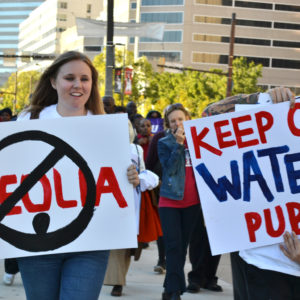All the fearless organizing by people challenging Veolia, the world’s largest water privatization corporation, has paid off in a big way: Veolia has been forced to abandon a flagship strategy for pursuing water privatization in U.S. cities. And it’s all thanks to you. For years, you’ve stood with communities from New York City to St. Louis, and from Baltimore to Pittsburgh, who’ve been challenging and exposing Veolia’s privatization schemes.
The private water industry has long seen the United States as a prime expansion market. Veolia has spent years promoting a contract model it calls “Peer Performance Solutions” (PPS) to cities across the U.S. Now, after the success of people like you organizing and protesting to stop Veolia in city after city, the water privatization giant has been forced to stop pushing its PPS contracts in North America.
This is a huge victory for the human right to water. All people deserve access to clean, safe, democratically controlled water in order to thrive and live healthy lives. But water privatization undermines this fundamental right. While private water corporations claim to invest in water systems and improve “efficiency,” they prioritize maximizing profits above all else. Contracts with private water corporations come at a steep price for communities across the country, leading to problems like rate hikes, labor abuses, shortcuts that can jeopardize public health and safety, and millions of taxpayer dollars in extra costs.
So it’s crucial that we organize to stop cities from even signing these contracts with private water corporations in the first place.
We’ve been challenging Veolia’s PPS contract model for years for three primary reasons.
- First, Veolia launched the PPS model in the hopes of appealing to larger cities, but we understood it for what it was: a foot-in-the-door to secure larger privatization deals. The model gave Veolia the opportunity to forge a relationship with city leaders and push them on extensive privatization packages. Veolia was then able to take even more control over these water systems.
- Second, Veolia has a disastrous track record: Paris, where Veolia is headquartered, took back its water system from Veolia after the city found that the privatization deal was expensive and lacked transparency. Pittsburgh is facing a lead crisis following its PPS-plus-management contracts with Veolia. And Veolia’s cost-cutting initiatives in New York City jeopardized safety and generated strong labor opposition.
- Third, these contracts are unique in that instead of just receiving a flat fee for its services, Veolia also gets a cut of money based on its “performance” — which overwhelmingly emphasizes cost-cutting, jeopardizing people’s health and safety.
In partnership with activists like you, local groups, and national allies like Food & Water Watch, we exposed Veolia’s track record of abuse in the cities it targeted through grassroots organizing, mobilizing public officials, and securing media coverage. In Pittsburgh, we partnered with the Our Water Campaign and In the Public Interest to raise the visibility of Veolia’s abuses and ultimately ensure the mayor move to keep the city’s water system in public hands. In St. Louis, months of organizing by the Dump Veolia coalition made privatization a top issue in the mayoral election, ultimately forcing Veolia to withdraw its PPS proposal. After four months of organizing with the One Baltimore United coalition and members like you in Baltimore, the city rejected a deal with Veolia. And those are just three of the victories in the last few years. The movement of people challenging Veolia has become a formidable force across the country and around the globe.
So formidable that Veolia has finally been forced to stop pushing its foot-in-the-door PPS model in North America.
The first to report Veolia’s departure from this strategy was the industry trade journal Global Water Intelligence (GWI). GWI’s coverage specifically cites grassroots campaigning in its report on Veolia’s retreat. According to GWI, after the public outcry in Pittsburgh, Veolia has been unable to secure another PPS contract in North America. The GWI report went so far as to say the “difficulties with [the PPS] arrangement with Pittsburgh effectively brought an end to the concept.” It’s clear: The power that we’ve built together has the entire private water industry taking notice.
Now, we’ll double down alongside our allies to continue to challenge Veolia and uphold the human right to clean water at rates everyone can afford.
President Trump’s recently released infrastructure plan paves the way for Veolia and other corporations to privatize public services like water systems. You can help make sure that plan does not become a reality by urging your members of Congress to reject this plan and any other proposal that would turn over our most essential public resource to private hands.




